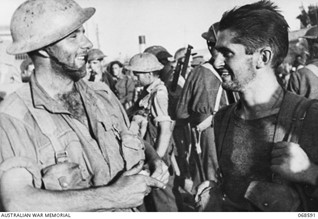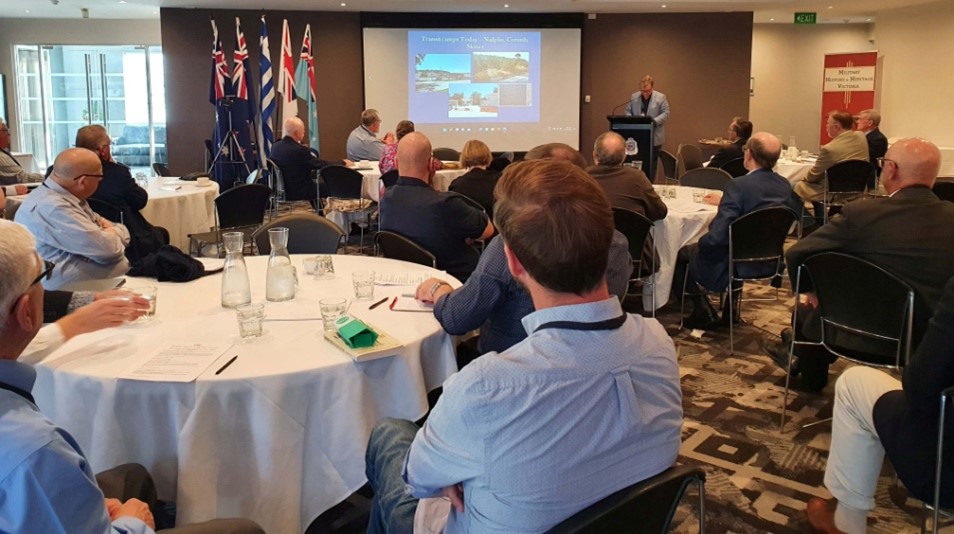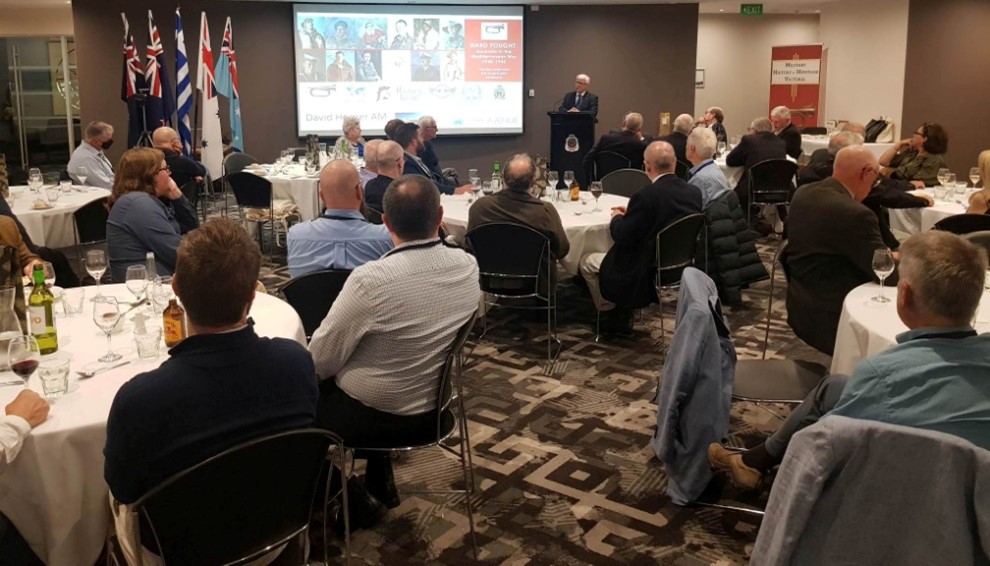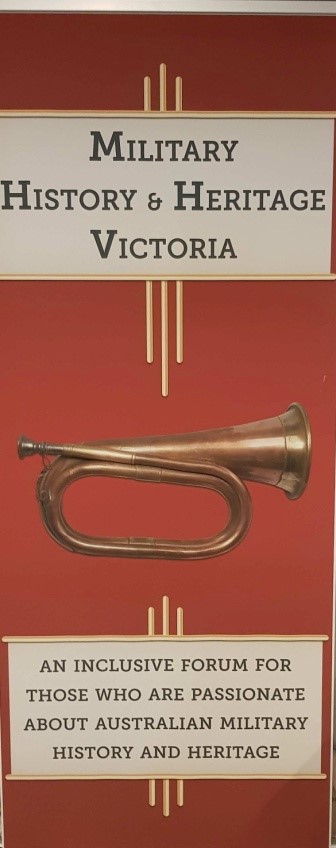The Greek campaign of 1941 recently featured in a major military history conference held in Melbourne. The Conference was held on 9-10 April, coinciding with the 81st anniversary of the German invasion of Greece in 1941.
Click here to see the full conference program

Note: Some presenters papers are linked to their names in this article. Click on them to view the papers.
The Conference was held at the Glen Waverley RSL and was organized by Military History and Heritage Victoria, with a range of significant presentations on the theme of Hard Fought: Australia and the Mediterranean Theatre, 1940-45. As one of the major actions in this theater of military operations, the Greek campaign featured in a number of the presentations.
The Conference was opened by its patron, Major General Jim Barry AM MBE RFD ED (Ret), with the keynote address delivered by the distinguished Australian military historian Emeritus Professor David Horner AM of the Strategic & Defence Studies Centre. Professor Horner set the tone for the conference, providing a strategic overview for the role of the Mediterranean Theatre of the Second World War and Australia’s role in it.
While a number of other important presentations were made (such as on the Syrian campaign and Tobruk sieges), a key feature of the conference was a number of presentations on various aspects of the Greek campaign. This is my review of the Greek campaign aspects of the conference.
Many readers will be aware of the contribution made to study of the campaign by Dr Peter Ewer, whose book Forgotten Anzacs has played such an important role in stimulating interest in its history. Dr Ewer’s presentation looked at the diplomatic and military background to the Allied decision to commit to the defence of Greece, placing this in the context of the British aim of securing US support for the war against the Axis.
Drawing on detailed archival sources, revealing the content of various British War Cabinet meetings and decisions, Dr Ewer put the case for the British support for the Allied commitment to the Greek campaign as part of the wider need to persuade the US Congress to support President Roosevelt’s proposal for the vital Lend-Lease logistical support program. As he concluded, while the Allied commitment to the Greek campaign may have been seen as a military folly by some military planners, it was nevertheless a political masterstroke. Author Brent Taylor discussed Australian leadership in the Greek campaign, focusing on the role and leadership of General Blamey.
The naval aspects of the Greek campaign were outlined in two presentations. The presentation by journalist and author Mike Carlton drew on his previous research into the history of HMAS Perth – one of Australia’s major naval contributions to the Greek campaign – as well as that for his new publication into the Australian naval contribution to the Mediterranean. Due to the age of most of the vessels, the Australian fleet in the theatre was referred affectionately as “the scrap-iron flotilla”.
Mr Carlton’s presentation outlined the key engagements of the Australian vessels; especially their part in the key battles of Cape Spada and Matapan, both important immediate precursors to the land aspects of the Greek campaign, delivering heavy blows to the Italian fleet which effectively ended the latter’s potential involvement in the campaign. A feature of his presentation was his use of first hand Australian accounts, detailing the Australian sailor’s experience of these engagements. His new book – The Scrap Iron Flotilla – which will deal with these naval aspects of the Greek campaign will be published soon.
A very interesting presentation on the naval aspects of the battle of Crete was made by Chief Petty Officer Pete Cannon, CSM, of the Royal Australian Navy. In his presentation he outlined the naval preparations for the battle, including the proposed responses to the anticipated German naval invasion. The defeat of the latter was outlined as was the critical Allied lack of air support which proved fatal to the overall fortunes of both the Royal Navy and Royal Australian Navy’s contribution to the battle of Crete. The important role of both navies’ in the subsequent Allied evacuation of Crete was discussed and the terrible toll exacted on Allied shipping. The Axis command of the air – not only from the Greek mainland but more importantly from Italian air bases in the Dodecanese (such as Karpathos) saw loss and damage to much Allied shipping engaged in the evacuation, such as that from Heraklion as it sailed the Kasos strait to the east of Crete. The naval impact of the battle of Crete was devastating for the Allied Mediterranean Fleet based in Egypt.
Another naval presentation concentrated on the involvement of one Australian warship – HMAS Stuart – in the Mediterranean. Delivered by researcher Greg Pierce, this included discussion of the warships part in the Greek campaign, with its engagement in the battle of Matapan, the transport of Allied troops to and from Greece as well as its involvement in the battle and evacuation of Crete.
It was my pleasure to contribute to a discussion of the experience of Australian prisoners following the end of the Greek campaign, doing so alongside ABC journalist Stephen Hutcheon. Mr Hutcheon recounted the experience of his uncle, Private Jack Greaves, who served in Greece during the campaign, was captured and made his successful escape back to Allied lines in the Middle East. The presentation was based on Mr Hutcheon’s ABC radio program on the topic and drew on a trove of personal letters, a diary and official reports. He also drew on the records and photographs of other diggers who escaped with Jack.
Jack took part in the bitter fighting at Pinieos Gorge in northern Greece, which saw the Anzac defences overrun and many defenders captured, Jack being one of them. After a period in the dreaded Thessaloniki POW camp, Jack was able to escape from the German train as it transported prisoners north into German-occupied Europe. Mr Hutcheon recounted Jack’s escape, returning to Greece, moving from village to village, helped by locals, until he was eventually able to cross the Aegean to landfall on neutral Turkey. After a period in Turkish custody, Jack was able to return to Allied lines in Syria.
My own presentation detailed the Australian prisoner experience in Greece – from the decision to surrender, through of the various small transit or holding camps established throughout Greece (were Allied soldiers were captured and concentrated, such as Chania on Crete or Nafplio in the Peloponnese), the move north through larger camps such as that established at Corinth until their arrival at the main German POW camp in Greece at Thessaloniki. The experience of Australians and other Allied prisoners at the latter camp was the focus of my presentation – the arrival at the camp, the terrible living conditions there, the vermin-ridden accommodation, the poor food, the prevalence of illness and death, limited medical treatment available and the brutality of the guards.
Nearly all Allied prisoners captured in Greece spent some time here, the camp operating from May to November 1941, with the total rising to 12,000 in one period. It was universally referred to by Allied prisoners held there as a “hell camp”. I detailed some of the escapes from the camp, including that by Frankston’s Lance Corporal Skip Welsh, who survived in the city with the help of brave locals and who eventually returned to Allied lines in the Middle East. I stressed the fact that all escapers relied on the support and assistance of brave local Greeks to succeed in their efforts, a fact that is reflected in the many heartfelt expressions of gratitude made by the escapers.
Another presentation also touched on a little known aspect of the war in Greece. In her detailed presentation on the Yachtsmen Scheme which saw the recruitment of many Australian yachtsmen and rowers into the Royal Navy during the Second World War, author Janet Roberts Billett recounted the story of one Australian former yachtsman who would eventually serve with the Allied Special Operations Executive, operating craft in support of the resistance movements in Yugoslavia and Greece. He would be present in Athens by the end of the war, a photograph showing him alongside his comrades in the Greek resistance movement.
Other important presentations were delivered – the Northern Threat and its impact on the Allied defence of both Syria and Egypt (Ian Crellin), the Syrian Campaign (Dr David Sutton), Tobruk (author David Mitchelhill-Green), a personal story of an Australian soldier at Tobruk (author Mike Rosel), Medical aspects of the Mediterranean Theatre (Colonel Ret Dr Brett Courtney OAM), two on the RAAF in the Mediterranean (historian Martin James and author Adam Lunney) and a reflection on those who paid the ultimate sacrifice for their involvement in the theatre (Dr Andrew Kilsby). Another interesting presentation concerned the logistical and economic importance of the region to Australia and the Allies, particularly as this related to ensuring fuel security during the war and the importance of safeguarding the Iranian and Arabian Peninsula oilfields, the presentation made by Nicole Townsend (University of NSW).
The presentations at the conference were very authoritative and interesting. Taken together they provided both excellent overviews and detailed studies of various aspects of the Australian involvement in the Mediterranean during the Second World War. The feature on the Greek campaign, across a number of its aspects was a timely and welcome contribution to the commemoration of the 81st anniversary of the campaign. The conference organizers – Dr Andrew Kilsby, Professor Peter Edwards AM and patron Major General Jim Barry – are to be commended.
The Conferences was supported by a range of sponsors, including the Battle of Crete and the Greek Campaign Commemorative Council and the Cretan Federation of Australia and New Zealand. It was great that such a collection of important presentations on the Greek campaign was supported by Greek community organizations. One can only hope that this will be repeated in the future.
Readers who would like to find out more are referred to the various books mentioned – Peter Ewer’s Forgotten Anzacs, Mike Cartlon’s Cruiser and forthcoming The Scrap Iron Flotilla, Janet Roberts Billett’s forthcoming The Yachties and my own soon to be released Grecian Adventure – as well as Stephen Hutcheon’s ABC podcast Escape from Greece 1941 (https://www.abc.net.au/radionational/programs/the-history-listen/shanghai-digger/13322620).
Readers who would like to support or join the Military History & Heritage Victory organization should contact the author for further information. Or click on “Join Us” above.
Jim Claven is a trained historian, freelance writer and published author who has been researching the Hellenic link to Anzac across both world wars for many years. He is Secretary of the Lemnos Gallipoli Commemorative Committee, author of Lemnos & Gallipoli Revealed and the forthcoming Grecian Adventure. He can be contacted via email jimclaven@yahoo.com.au




Contact Military History and Heritage Victoria about this article.






